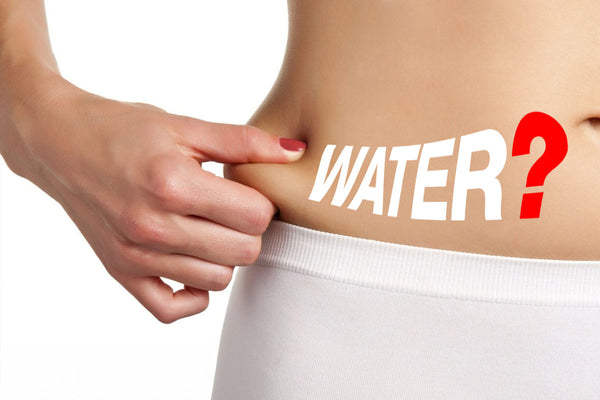Have you spent the past few weeks rigorously dieting, training hard, and knocking out endless cardio sessions, only to find that you can’t seem to lose that last bit of “stubborn” body fat?
Are you stuck in some kind of wonky fat loss plateau that’s sidelining your body transformation progress?
Maybe not.
That “stubborn” fat might not even be fat at all, but rather stubborn water weight that just needs to get flushed from your body.
Water retention is incredibly common amongst dieters as well as those seeking to build muscle, and usually not a cause for concern.
Here we present several options to help you eliminate unwanted water weight and get the sleek, toned midsection you want!
Seven Ways to Prevent Water Retention
Eat Less Salt
Salt supplies our bodies with the essential mineral and electrolyte sodium, which helps maintain fluid balance in the body and also supports normal nerve and muscle function.
However, too much salt consumed in a short period of time can lead to immediate water retention. The reason for this is that the body keeps a tight balance between water and sodium. Consuming more sodium will mean that your body has to hold onto more water to keep everything in balance.
Therefore, one of the simplest and easiest ways to help prevent water retention is to limit the amount of high sodium foods you consume. Some of the most common high-sodium foods found in the diet are cheese, bread, cold cuts, canned goods, and basically any processed food that is in a box, bag, or wrapping.
The latest Dietary Guidelines for Americans recommend limiting sodium intake to 2,300 mg per day, yet recent estimates suggest that the average American consumes over 3,400 mg every day.[1,2,]
Focusing on consuming whole foods rather than processed ones will naturally help you to lower your sodium intake and prevent excessive water retention.
Now, this doesn’t mean you need to completely eliminate sodium from your diet (which you shouldn’t do), as it’s needed for proper hydration as well as your ability to perform at a high level in your workouts.
Reduce Carbohydrate Intake
When we consume carbohydrates, the body inherently holds onto more water. The reason for this is that when we eat carbohydrates, any portion of it that isn’t immediately used for energy is stored in skeletal muscle as glycogen. Along with each gram of glucose stored in glycogen, the body also stores an additional 3 grams of water.[3]
Reducing your carbohydrates forces your body to tap into its glycogen stores more, which helps eliminate some of the water weight.
Note: this is why low-carb diets lead to such large drops in weight when people first start them...it’s not true fat loss, but water weight loss.
If you’re just looking to drop some water weight but don’t need to lose any more fat, make sure to replace the calories you’re not getting from carbohydrates with a mixture of protein and fats. Otherwise, you’ll be in a calorie deficit and will begin to lose weight.
Increase Potassium Intake
Similar to sodium, potassium is another mineral/electrolyte that serves a number of important roles in the body. For instance, potassium helps conduct electrical signals and plays a key role in heart health.[4]
Potassium also works hand-in-hand with sodium to regulate fluid balance in the body. As such, one of the easiest ways to help reduce water retentions is to increase your intake of potassium-rich foods, which helps reduce sodium levels in the body and increase urine.[5]
Foods rich in potassium include cooked spinach and broccoli, potatoes, bananas, tomatoes, and avocados.
Break a Sweat
This might seem rather obvious, but one of the best ways to reduce water weight is to engage in intense exercise. This increases sweat, which means your body is losing water.
In fact, one hour of intense exercise can result in a fluid loss of up to 64 ounces[6], depending on your workout clothing and temperature where you’re exercising.
Now, it’s important that you also stay properly hydrated during exercise and replace valuable minerals (like potassium) that are lost through sweat. Another great option to try after your workout is a quick trip in the sauna or steam room which increases sweating further.
Reduce Stress
Chronic stress increases the release of cortisol, which directly affects water retention in in the body. The reason for this is that cortisol (by way of stress) increase a hormone called antidiuretic hormone (ADH), which reduces water elimination by instructing the kidneys to pump water back into the body rather than excrete it.[8,9]
Therefore, limiting stress helps maintain lower levels of cortisol and ADH, which helps prevent water retention and supports weight loss.
Drink More Water
This might seem counterintuitive, but increasing your water intake can actually help reduce water retention.[12]
Remember above, we mentioned that sodium and water maintain a delicate balance in the body. Well, when you do not drink enough water, your body enacts certain physiological processes that force it to hold onto more water. Therefore, increasing your water intake tells your body water isn’t scarce and it can excrete the water it’s been retaining.
Proper hydration is also important for liver and kidney health, both of which play roles in the amount of water the body holds onto as well as various detoxification processes.[10,11]
Now, there’s no need to over hydrate, and consuming excessive amounts of water can lead to hyponatremia, which is a condition resulting from a lack of sufficient electrolytes in the body. As such, drink until you are no longer thirsty and feel properly hydrated.
Try Supplements
In addition to the measures outlined above, you can also try various dietary supplements to help eliminate unwanted water weight. A number of all natural supplements including vitamin B6, magnesium, dandelion, horsetail, and uva ursi have been noted to improve water removal from the body and help reduce bloating and puffiness.
Rather than have to source each of these nutrients separately (which is both time-consuming and expensive), we’ve done the hard work for you and created an all-natural water elimination supplement in Water Shred.
Water Shred contains NINE different herbal diuretics to help you reduce water retention and get the sleek, toned midsection you want. We’ve also included valuable electrolytes, minerals, and vitamins to support proper hydration and muscle function.
Click here to learn more about Water Shred and how it can help you eliminate unwanted water weight.
References
- "2015-2020 Dietary Guidelines." Home of the Office of Disease Prevention and Health Promotion - Health.gov, health.gov/dietaryguidelines/2015/guidelines/.
- "Sodium Fact Sheet." Centers for Disease Control and Prevention, 2 Nov. 2018,www.cdc.gov/dhdsp/data_statistics/fact_sheets/fs_sodium.htm.
- Kreitzman, S. N., Coxon, A. Y., & Szaz, K. F. (1992). Glycogen storage: illusions of easy weight loss, excessive weight regain, and distortions in estimates of body composition. The American Journal of Clinical Nutrition, 56(1 Suppl), 292S-293S. https://doi.org/10.1093/ajcn/56.1.292S
- D’Elia, L., Barba, G., Cappuccio, F. P., & Strazzullo, P. (2011). Potassium intake, stroke, and cardiovascular disease a meta-analysis of prospective studies. Journal of the American College of Cardiology, 57(10), 1210–1219. https://doi.org/10.1016/j.jacc.2010.09.070
- Gallen, I. W., Rosa, R. M., Esparaz, D. Y., Young, J. B., Robertson, G. L., Batlle, D., … Landsberg, L. (1998). On the mechanism of the effects of potassium restriction on blood pressure and renal sodium retention. American Journal of Kidney Diseases : The Official Journal of the National Kidney Foundation, 31(1), 19–27.
- Hackney KJ, Cook SB, Fairchild TJ, Ploutz-Snyder LL. Skeletal muscle volume following dehydration induced by exercise in heat. Extrem Physiol Med. 2012;1(1):3. Published 2012 Sep 4. doi:10.1186/2046-7648-1-3
- Sawka, M. N., Burke, L. M., Eichner, E. R., Maughan, R. J., Montain, S. J., & Stachenfeld, N. S. (2007). American College of Sports Medicine position stand. Exercise and fluid replacement. Medicine and Science in Sports and Exercise, 39(2), 377–390. https://doi.org/10.1249/mss.0b013e31802ca597
- Oka, Y., Wakayama, S., Oyama, T., Orkin, L. R., Becker, R. M., Blaufox, M. D., & Frater, R. W. (1981). Cortisol and antidiuretic hormone responses to stress in cardiac surgical patients. Canadian Anaesthetists’ Society Journal, 28(4), 334–338.
- Dugue, B., Leppanen, E. A., Teppo, A. M., Fyhrquist, F., & Grasbeck, R. (1993). Effects of psychological stress on plasma interleukins-1 beta and 6, C-reactive protein, tumour necrosis factor alpha, anti-diuretic hormone and serum cortisol. Scandinavian Journal of Clinical and Laboratory Investigation, 53(6), 555–561.
- Lautt, W. W. (2009). Hepatic Circulation: Physiology and Pathophysiology.. San Rafael (CA).
- Liska, D. J. (1998). The detoxification enzyme systems. Alternative Medicine Review : A Journal of Clinical Therapeutic, 3(3), 187–198.
- Negoianu, D., & Goldfarb, S. (2008). Just Add Water. Journal of the American Society of Nephrology, 19(6), 1041 LP – 1043. https://doi.org/10.1681/ASN.2008030274





